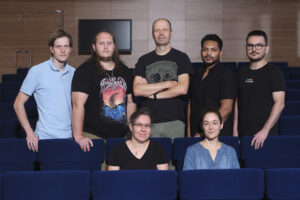Jan Čapek won the institutional PhD Thesis Competition. He is working on uncovering the importance of manganese in bacteria, one of which is Bordetella pertussis that causes whooping cough. “In my PhD thesis, I discovered that B. pertussis accumulates high amounts of manganese, but at the same time has a genetic trick that helps it overcome potential intoxication with this metal. Nothing similar has been described so far.” He is now continuing as a postdoctoral fellow in the Laboratory of Post-Transcriptional Control of Gene Expression, where he continues to study the importance of manganese in pathogens.
Have you always wanted to do research? What drew you to science?
It wasn’t until college (UCT Prague) that I found out that I might enjoy it.
Science as such is going through a serious crisis of reproducibility, which probably arises from an unhealthy pressure to perform – to publish. This effect has significant sabotaging consequences on our progress. I enjoy working in a laboratory in a young team, quality literature, writing in English, applying the acquired knowledge directly in experiments, the possibility of internships, etc. I firmly believe that the principle of science as such will lead more.
Why did you decide to do your PhD at the IMIC?
I didn’t think it through that much. But I certainly prefer established traditional institutions to emerging centers, however I think that research at universities is a bit more difficult. The IMIC has excellent results and laboratories and met the above conditions. In total, I completed four interviews at the IMIC, otherwise I had no alternative plan. In addition, there is a beautiful campus and housing can be found nearby.
You won the institutional PhD Thesis Competition. What is your PhD thesis about?
The main topic of my PhD thesis was created “on the fly”, as with increasing knowledge we continued to move beyond the main mission of our laboratory, which is the research of small non-coding RNAs in the human pathogen Bordetella pertussis. So, I went from small RNAs to study the importance of manganese in this and related pathogens. In general, manganese in bacteria is definitely not a mainstream research topic, so I think there are a lot of surprises in store for the future regarding the importance of manganese. For example, in my PhD thesis I discovered that B. pertussis accumulates high amounts of manganese in the cytosol, but at the same time possesses a genetic trick that helps this bacterium to overcome possible intoxication with this metal. Nothing similar has been described so far. Additionally, during my PhD I discovered that although it is known that manganese is an element highly valued by bacteria, it is not really clear why. Therefore, my PhD thesis also contains extensive reflection on the importance of manganese in bacteria.
You are currently doing a postdoctoral fellow in the Laboratory of Post-Transcriptional Control of Gene Expression. What are you focusing on in your research right now?
We found that other Bordetella species that specifically infect the human host also accumulate manganese. It seems that, on the other hand, species that are pathogenic but not for humans do not accumulate manganese. This is very interesting, and we are currently focused on confirming this particular phenotypic expression. In addition, we hope that by carefully studying manganese in these pathogens, we can provide at least a partial answer to the already mentioned question, what is the importance of manganese in bacteria.
What do you enjoy most about your job?
The utilization of manganese by prehistoric cyanobacteria in oxygenic photosynthesis gave rise to the aerobic atmosphere in which we live today. If manganese was not used by bacteria in this way, the Earth would face the same fate as Mars – due to the absence of an ozone layer, water would be decomposed by radiation and hydrogen would evaporate into space. But luckily, we have bacteria that use manganese.
I enjoy literature related to manganese because the meaning of this metal goes very deep. It’s also fun to test your own ideas, although it’s also frustrating because you get it wrong 99% of the time.
What do you enjoy besides science? What do you do in your spare time?
My wife is also finishing her PhD here at the IMIC and we have a one-and-a-half-year-old son and we are not originally from Prague. So, I spent a lot of free time with my son.

What are your plans and dreams in your professional life?
Thanks to PPLZ (programme to support prospective human resources) from the Czech Academy of Sciences and grants received by our head of the laboratory, Dr. Večerek, we could agree to complete one more publication regarding the accumulation of manganese in pathogenic species of the genus Bordetella. Then ideally, I would like to get my own funding for a postdoctoral position somewhere abroad.
Thank you and we wish you the best of luck!



